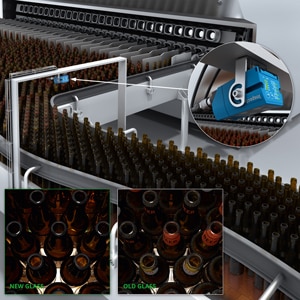SICK is launching its first vision camera with a pre-installed Deep Learning app onboard to make it simple to create custom quality inspections of complex or irregular-shaped goods, packaging and assemblies, especially where they may have previously defied automation using traditional systems.
The SICK Intelligent Inspection Deep Learning App runs on SICK’s newly launched Inspector P621 2D programmable vision camera. The all-in-one package enables machine builders and end-users to set up vision classifications using artificial intelligence in a fraction of the time and cost it would take to program challenging inspections based on recognising the pre-set rules and patterns of traditional vision systems.
Practical and Affordable AI Classification
Where it has previously been very challenging to achieve consistently robust and repeatable quality inspections, with SICK Intelligent Inspection they can now be mastered with high levels of reliability and availability. Automation is therefore now practical and affordable for complex imaging tasks such as sorting fresh fruit and vegetables, checking the orientation of timber profiles by recognising the annual ring structure, checking leather car seats for creases or flaws, or inspecting the integrity of solders in surface mount assemblies.
Neil Sandhu, SICK’s UK Product Manager for Imaging, Measurement and Ranging explains: “By embedding the Intelligent Inspection App onto SICK’s Inspector P621 deep learning camera, SICK has made it possible for users to purchase a ready-made package that uses artificial intelligence to run complex vision inspections with ease.
“Users are guided through an intuitive process that teaches the system how to recognise ‘good and bad’ examples using SICK’s specially-optimised neural networks in the cloud.”
Intuitive Step-By-Step Process
Using the SICK Inspector 621’s in-built image capture tool, users begin by collecting example images of their product in realistic production conditions. Guided step-by-step through the intuitive graphic interface, the system prompts them to sort the images into classes. Using SICK’s dStudio service, the pre-sorted images are uploaded to the Cloud where the image training process is completed by the neural network. The user can then apply further production images to evaluate and adjust the system.
Once the user is satisfied, the custom-trained deep learning solution is downloaded to the SICK Inspector P621 camera where it can begin to take decisions automatically with no further Cloud connection necessary. Results are output to the control system as sensor values and digital I/O.
The image inference is carried out directly on the device, so there is no need for an additional PC. As the system training is done in the Cloud, there is also no need for separate training hardware or software, saving on implementation time and cost.
“Because it runs directly on the camera, the SICK Intelligent Inspection app does not require any additional hardware,” Sandhu continues. “So, users can automate complex vision inspections for a much lower cost of ownership. They can now consider automating quality inspections of products or goods that have just proved too difficult previously.
“Even better, the system can be set up in no time at all. Many users will be able to manage this process themselves. However, if needed, SICK is also offering services to support customers through the feasibility, commissioning and neural network training process.”
Users also have access to a large set of traditional machine vision tools installed as standard on the SICK Inspector P621, so they can extend the functionality of their quality inspection further. Developers working in SICK’s AppSpace can also use SICK’s Nova software tools for further custom development and to create their own SensorApps. Starting with the Intelligent Inspection on-camera package still saves significant development time and cost.
SICK Inspector P621
The SICK Inspector P621 is a versatile all-in-one 2D CMOS vision sensor with 1.3mpix image resolution. With flexible illumination provided by powerful on-board LEDs, a high-quality lens, and an adjustable electric focus, the SICK Inspector 621 provides high-quality images out of the box to support the Deep Learning process. With a rugged IP65 housing, its compact 71mm x 43mm x 35.6mm dimensions mean it can be installed even in small machine spaces and at tight angles. Its versatility for many applications is assured through a wide range of communications interfaces and compatibility with EtherNET/IP, EtherCAT, Profibus and PROFINET fieldbuses.
SICK Deep Learning is also now available as licensed option for all InspectorP600 2D vision sensors. Initially available with image classification, the SICK Intelligent Inspection App, will be extended to incorporate anomaly detection, localisation and segmentation functions later in 2021.
